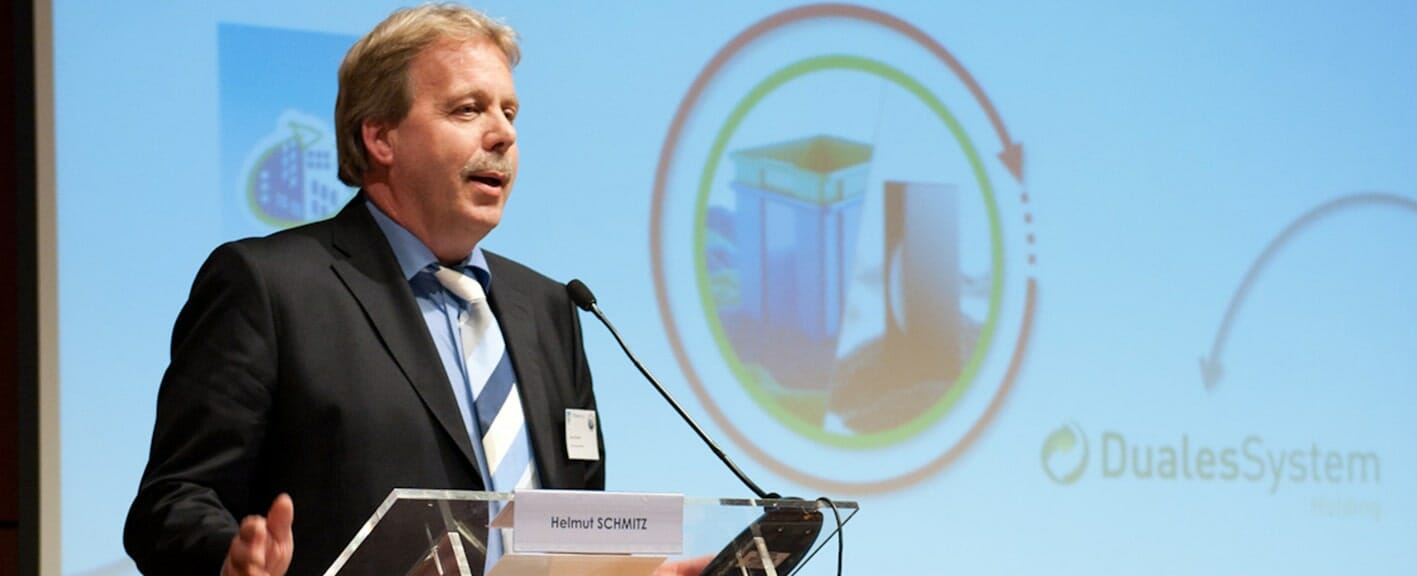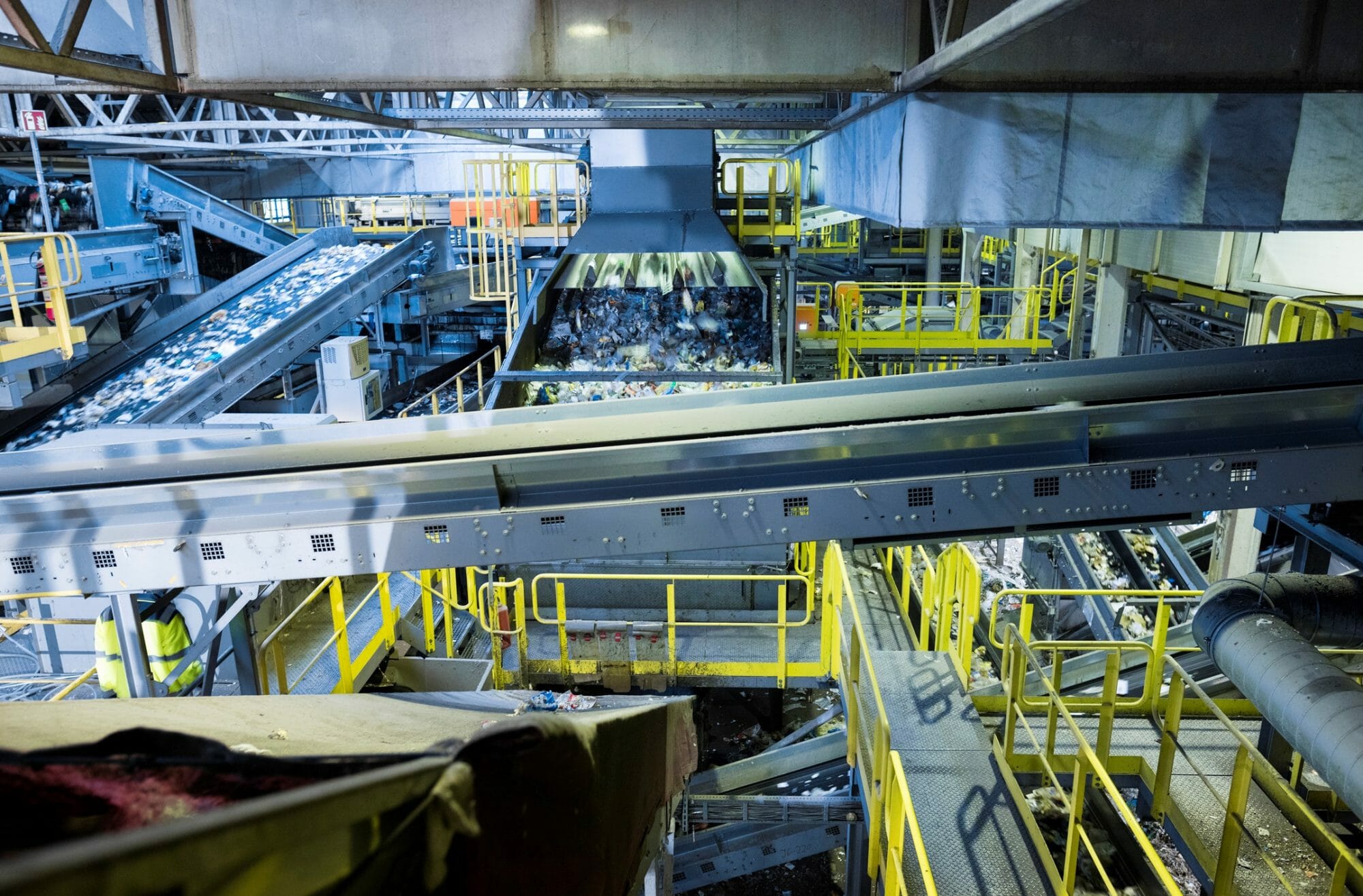
Interview with Helmut Schmitz, Head of Communications at Green Dot (Der Grüne Punkt)
We Cannot Hide Behind Others
Once upon a time every household in Germany was somehow involved with the Green Dot. The Green Dot (Der Grüne Punkt) is a registered trademark of the company Der Grüne Punkt – Duales System Deutschland GmbH (DSD) and stands for a functioning circular economy, i.e. the consistent use of recyclables from waste. It was established in 1990. The idea of the so-called Dual System was to relieve trade and industry of the return and disposal of all sales packaging. The plan worked.
Today the Green Dot symbolically stands for the systematic collection and recycling of consumer packaging. The lack of comparable systems in the emerging countries of Southeast Asia is one of the main causes of plastic in the environment.
A delegation from the Röchling Foundation visited the successful recycling company and spoke with Head of Communications Helmut Schmitz about local and global tasks.
Your company has significantly expanded the area-wide collection of packaging waste in households. Where do you see the next challenges for an improved recycling economy in Germany and other industrial countries?
The topic of plastic has been the focus of public attention for months. The consumption of plastic seems to be more and more problematic, because we encounter the images of littered South Sea islands and dying seabirds every day in the media. Too many companies are still waiting to see whether the consumer will really base his purchase decision on topics such as the recyclability of packaging or the use of recyclate. Latest studies provide clear answers. For some, is does not seem to be a real task to meet the new recycling quota. They rather accept the realistic threat of a tax on plastic. It is in our hands now to commonly work on it.
The Green Dot now produces its own granulates from plastic waste – x – and offers them to industry as a material. Can such recycled materials help reduce newly produced plastic significantly in the long run?
Plastic is an enormously versatile material. It is not easy to be replaced. Therefore, we must use it responsibly and treat it as a high-quality material: As much as necessary, as little as possible. And what we use should be used again and again, recycled so that plastic does not become waste. If we regard plastic as what it is, namely a valuable raw material, then we will treat it in the same way and thus prevent it from being released into the environment.
The German Packaging Act is a step in the right direction. It significantly increases recycling rates and, for the first time, promotes the recycling-friendly design of packaging and the use of recyclates. The Recyclat Initiative founded by Werner & Mertz has shown how it works, above all because it has brought everyone on board, from the product developer to the packaging manufacturer, the recycler and ultimately the consumer. Some other manufacturers are now following this example and using recycled materials for their packaging. Or at least they are experimenting with it. It is precisely such initiatives that we need now.
Therefore, I am even more surprised on the fact that many companies are still waiting to see whether consumers will really tie their purchase decisions to topics such as the recyclability of packaging or the use of recycled materials. Some even neglect the fulfilment of new recycling quotas in the Packaging Act as their task.
By now, we are aware that more than 50 percent of the plastic currently ending up in the ocean are produced by only five Asian countries. The economies there are catching up on consumption without a functioning waste management system developing at the same time. Do you see any possible solutions?
The concept of extended producer responsibility for packaging was successful in Germany. The manufacturer is obliged to take care of his packaging even after consumption. If we do not pull in the same direction, i.e. if we do not include recycling in the design of packaging and products, we will not be able to achieve our goals.
We have reached a very important point in time: there is an opportunity to create a responsible use for plastic. It is a first step into a worldwide recycling economy.
How does the Green Dot get involved as an experienced actor on a global level?
The Green Dot has a special responsibility in the implementation of recycling management, both nationally and internationally. We are pioneers in plastic recycling and range amongst the technology leaders of this field. For us, recycling management is not a vision, but an innovation factor that can create and secure new markets and jobs. With the project Mission 100 %, we would like to engage in a targeted dialogue with industry, trade, politics and consumers and demonstrate the advantages of a sustainable product policy for the economy and society.
In the years ahead, the quantity of newly produced plastic will increase sharply. Can this be controlled at all?
If we are able to show that in Germany and in Europe a recycling economy not only works but also offers solutions, it will have a great impact. We cannot afford to rely on the fact that the biggest polluters of marine waste can be found elsewhere. We have a responsibility within our country therefore we must fulfill our tasks.


